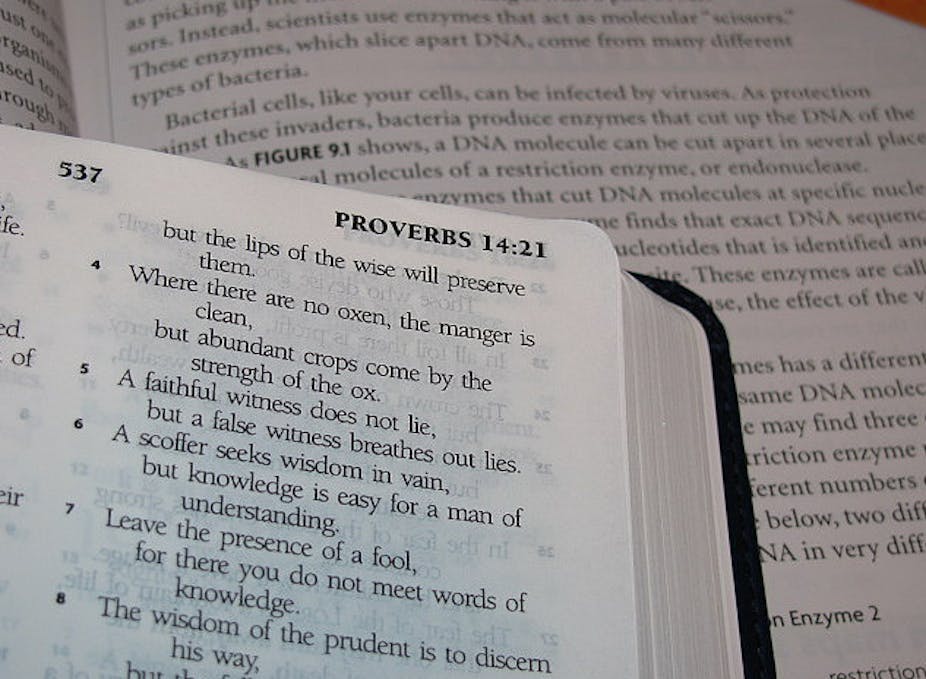After last week’s High Court challenge verdict on funding chaplains in schools, religious education is back in the headlines.
The role of religion in Australian schools has been vigorously debated for more than a century. Recent events including the landmark High Court case, the pending Victorian Civil and Administrative Tribunal (VCAT) case outcome in Victoria, the decision to review Special Religious Education programs in NSW, and the move towards a National Curriculum all highlight the need to examine the role of religion in Australia’s schools.
A changing curriculum
Before the National Curriculum was conceived in Australia, education had largely been the responsibility of state, rather than federal, governments. Consequently each state’s approach was different, and religious school curriculum varied significantly.
While a state by state account is beyond the scope of this article, a brief history of Victorian policies on religion and education provides some insight into the current issues.
From 1872, the secular nature of government schools in Victoria prevented any teaching of or about religion during school hours. There was, however, constant pressure from religious groups to have access to students and unofficial religious instruction did occur.
From the 1950s, volunteers from Christian and Jewish groups were permitted into government classrooms, but instruction was delivered alongside, rather than within, the official curriculum. In the 1990s, other faiths also began to offer Special Religious Instruction (SRI) programs, which now include Buddhist, Sikh, Baha’i, Hindu and Muslim options.
But it wasn’t until 2006 that state policy allowed for the teaching of general religious education (GRE) in Victoria. This involves teaching students about diverse religions within the curriculum. While some faith-based schools and organisations deliver such programs, they are by and large yet to be developed or resourced in Victoria’s government schools, except for in Years 11 and 12.
Instead, the Victorian government continues to fund ACCESS Ministries, an inter-denominational body that provides Christian education and chaplaincy in government schools. Other Special Religious Instruction providers do not receive state government funding to develop or deliver their programs. SRI classes are intended to instruct children into a particular faith tradition, whereas GRE programs teach children about diverse religions and beliefs and their role in society. Accredited volunteers from religious groups teach SRI, whereas GRE is taught by qualified teachers.
Religious teaching in a changing society
There are serious concerns about religious instruction in Australia, as its exclusive nature and its emphasis on particular religious traditions is problematic in an increasingly multi-faith society.
International and Australian scholars also argue that educating students about diverse religions and beliefs generates greater levels of inter-religious awareness, respect and understanding, and promotes social inclusion.

Despite a growing number of Victorians not ascribing to any faith, a proposal by the Humanist Society of Victoria to teach ethics classes as a non-religious option was rejected in 2010. In the recent Victorian case, Aitken and Others vs. DEECD, a group of parents argued that their children faced discrimination as a result of not participating in Special Religious Instruction classes. The case was heard in March, but the decision is yet to be announced.
Lagging behind
Australia’s government schools have been described by experts such as Cathy Byrne as “lagging behind” other nations with respect to their treatment of religion.
For example, the United Kingdom includes diverse religious education in their government schools and in Canada there are religions and ethics programs.
The National Curriculum provides an opportunity to address this in Australia. The “need to nurture an appreciation of and respect for social, cultural and religious diversity” has been given prominence within the Melbourne Declaration on Educational Goals for Young Australians and The Shape of the Australian Curriculum documents.
Religion and ethics in the National Curriculum
The Religions, Ethics and Education Network of Australia (REENA) was formed in February 2011 by leading Australian scholars, educators and community leaders. Over the past twelve months REENA has met with senior representatives in the Victorian, New South Wales and federal governments and with the Australian Curriculum, Assessment and Reporting Authority (ACARA), the agency responsible for the development of Australia’s National Curriculum, to discuss the place of religion in the National Curriculum.
While it was recently reported that hopes for a separate religion subject or a substantial religion component in Civics and Citizenship within the new Australian Curriculum have been dashed, ACARA is incorporating religions and ethics education into several subject areas, including History and Civics and Citizenship, and in the general capabilities and cross-curriculum priorities, such as Intercultural Understanding and Ethical Behaviour.
Opportunities for appropriate resource development, drawing on local and international best practice, are also being considered, in consultation with REENA.
These are, largely, optimistic developments. Awareness of diverse religious and non-religious worldviews is a crucial component for living and working in an increasingly diverse society.
Ensuring that religions and beliefs education is adequately developed and implemented across the National Curriculum will improve religious literacy and provide a critical education about the role of religion in society.
Despite increasing pressure from academics, parents and teachers, however, the issue of Special Religious Instruction in Victorian government schools is yet to be resolved. The recent review of ethics education programs in NSW recommended that Ethics classes should be allowed to continue and that an independent review of Special Religious Education (SRE) programs and ethics classes be conducted in 2014-2015.
REENA has called for a similar review in all Australian states that deliver SRI/SRE programs, with the hope that all Australian schools can offer inclusive religions and beliefs education for all students.

